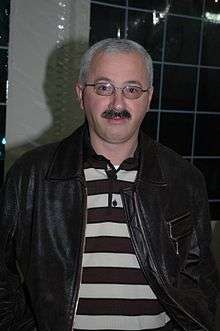Toufik Mansour
Toufik Mansour is an Israeli mathematician working in algebraic combinatorics. He is a member of the Druze community and is the first Israeli Druze to become a professional mathematician.[1]
Toufik Mansour | |
|---|---|
 Toufik Mansour | |
| Born | 17 January 1968 |
| Scientific career | |
| Fields | Mathematician |
Mansour obtained his Ph.D. in mathematics from the University of Haifa in 2001 under Alek Vainshtein.[2] As of 2007, he is a professor of mathematics at the University of Haifa.[3] He served as chair of the department from 2015-2017. He has previously been a faculty member of the Center for Combinatorics at Nankai University from 2004 to 2007, and at The John Knopfmacher Center for Applicable Analysis and Number Theory at the University of the Witwatersrand.
Mansour is an expert on Discrete Mathematics and its applications. In particular, he interested on permutation patterns, colored permutations, set partitions, combinatorics on words, and compositions. He has written more than 260 research papers, which means that he publishes a paper roughly every 20 days, or that he produces one publication page roughly every day.
Books
- Heubach, Silvia; Mansour, Toufik (2010), Combinatorics of Compositions and Words, Discrete Mathematics and its Applications, Boca Raton, Florida: CRC Press, ISBN 978-1-4200-7267-9, MR 2531482.
- Mansour, Toufik (2013), Combinatorics of Set Partitions, Discrete Mathematics and its Applications, Boca Raton, Florida: CRC Press, ISBN 978-1-4398-6333-6, MR 2953184.
- Mansour, Toufik; Schork, Matthias (2015), Commutation Relations, Normal Ordering, and Stirling Numbers, Discrete Mathematics and its Applications, Boca Raton, Florida: CRC Press, ISBN 978-1-4665-7988-0.
References
- Israel's first Druze math lecturer does it by the numbers, Israel21c, October 5, 2003.
- Permutations With Forbidden Patterns, Ph.D. thesis, T. Mansour, 2001, from the Haifa University Theses and Dissertations Collection, retrieved 2014-09-06.
- Faculty members Archived 2014-10-11 at the Wayback Machine, Mathematics Department, University of Haifa, retrieved 2014-09-06.